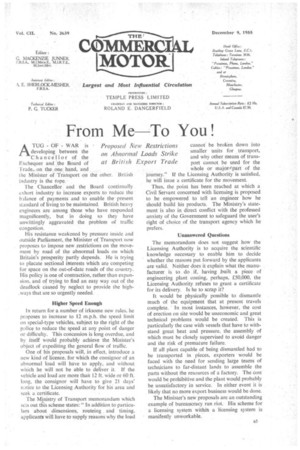From Me To You !
Page 39

If you've noticed an error in this article please click here to report it so we can fix it.
ATUG OF WAR is developing between the Chancellor of the Exchequer and the Board of Trade,on. the one hand, and the Minister of Transport on the other. industry is the rope.
The Chancellor and the Board continually exhort industry to increase exports to reduce the balance of payments and to enable the present standard of living to be maintained. British heavy engineers are among those who have responded magnificently, but in doing so they have unwittingly aggravated the problem of traffic congestion.
His resistance weakened by pressure inside and outside Parliament, the Minister of Transport now proposes to impose new restrictions on the movement by road of the abnormal loads on which Britain's prosperity partly depends. He is trying to placate sectional interests which are competing for space on the out-of-date roads of the country. His policy is one of contraction, rather than expansion, and of trying to find an easy way out of the deadlock caused by neglect to provide the highways that are so urgently needed.
Higher Speed Enough In return for a number of irksome new rules, he proposes to increase to 12 m.p.h. the speed limit on special-type vehicles, subject to the right of the police to reduce the speed at any point of danger or difficulty. This concession is long overdue, and by itself would probably achieve the Minister's object of expediting the general flow of traffic.
One of his proposals will, in effect, introduce a new kind of licence, for which the consignor of an abnormal load will have to apply, and without which he will not be able to deliver it. If the vehicle and load are more than 12 ft. wide or 60 ft. long, the consignor will have to give. 21 days' notice to the Licensing Authority for his area and seek a 'certificate.
The Ministry of Transport memorandum which scts out this scheme states: "In addition to particulars about dimensions, route* and timing, • applicants will have to supply reasons why the load cannot' be broken down into smaller units for transport, and why other means of transport cannot be used for the whole or majoritpart of the journey." If the Licensing Authority is satisfied, he will issue a certificate for the movement.
Thus, the point has been reached at which a Civil Servant concerned with licensing is proposed to be empowered to tell an engineer how he should build his products. The Ministry's statement is also in direct conflict with the professed anxiety of the Government to safeguard the user's right of choice of the transport agency which he prefers.
Unanswered Questions The memorandum does not suggest how the Licensing Authority is to acquire the scientific knowledge necessary to enable him to decide whether the reasons put forward by the applicants are valid. Neither does it explain what the manufacturer is to do if,. having built a piece of engineering plant costing, perhaps, £50,000, the Licensing Authority refuses to grant a certificate for its delivery. Is he to scrap it?
It would be physically possible to dismantle much of the equipment that at present travels complete. In most instances, however, the cost of erection on site would be uneconomic and great technical problems would be created. This is particularly the case with vessels that have to withstand great heat and pressure, the assembly of which must be closely supervised to avoid danger and the risk of premature failure.
If all plant capable of being dismantled had to be transported in pieces, exporters would be faced with the need for sending large teams of technicians to far-distant lands to assemble the parts without the resources of a factory. The cost would be prohibitive and the plant would probably be unsatisfactory in service. In either event it is likely that no more export business would be done.
The Minister's new proposals are an outstanding example of bureaucracy run riot. His scheme for a licensing system within a licensing system is manifestly unworkable.




















































































































